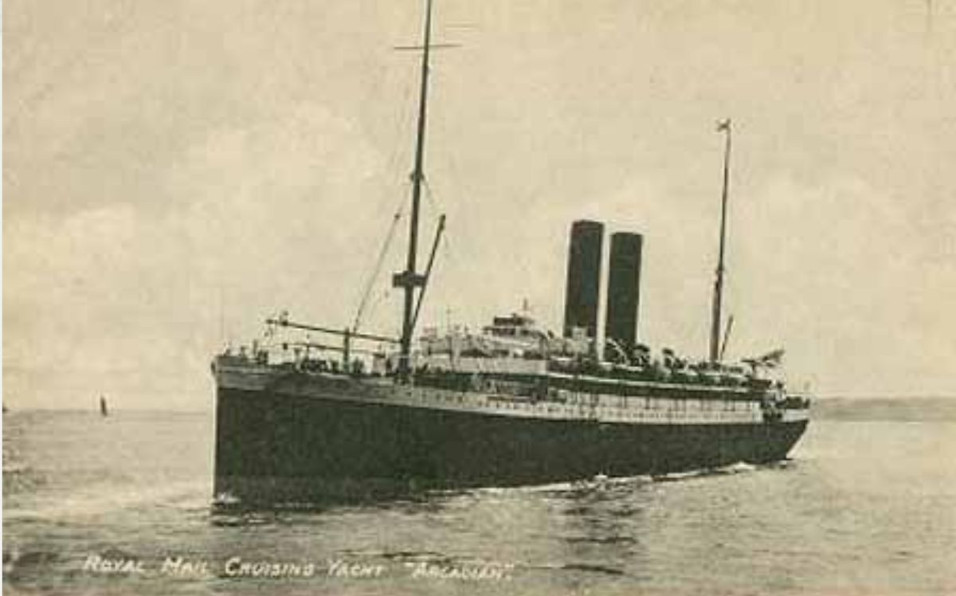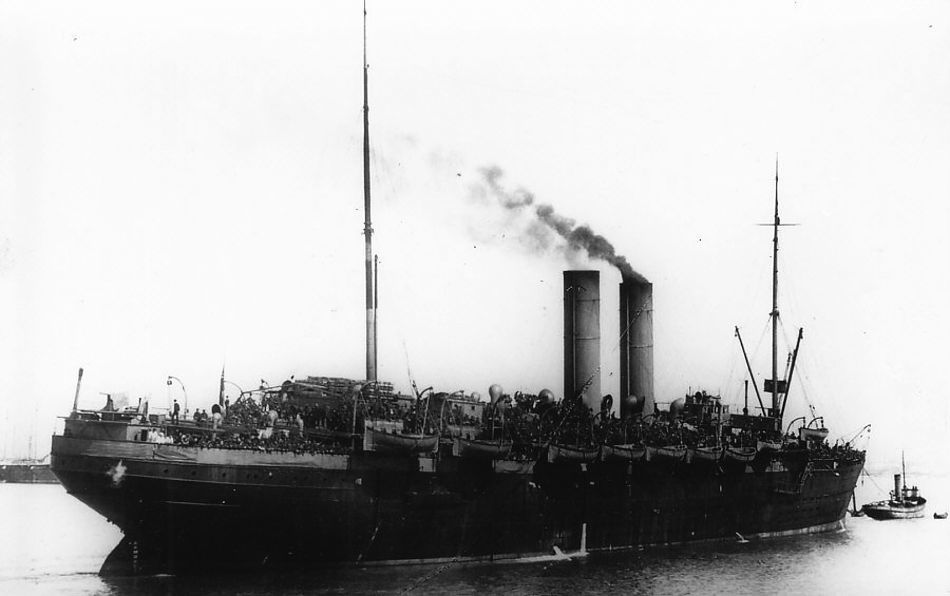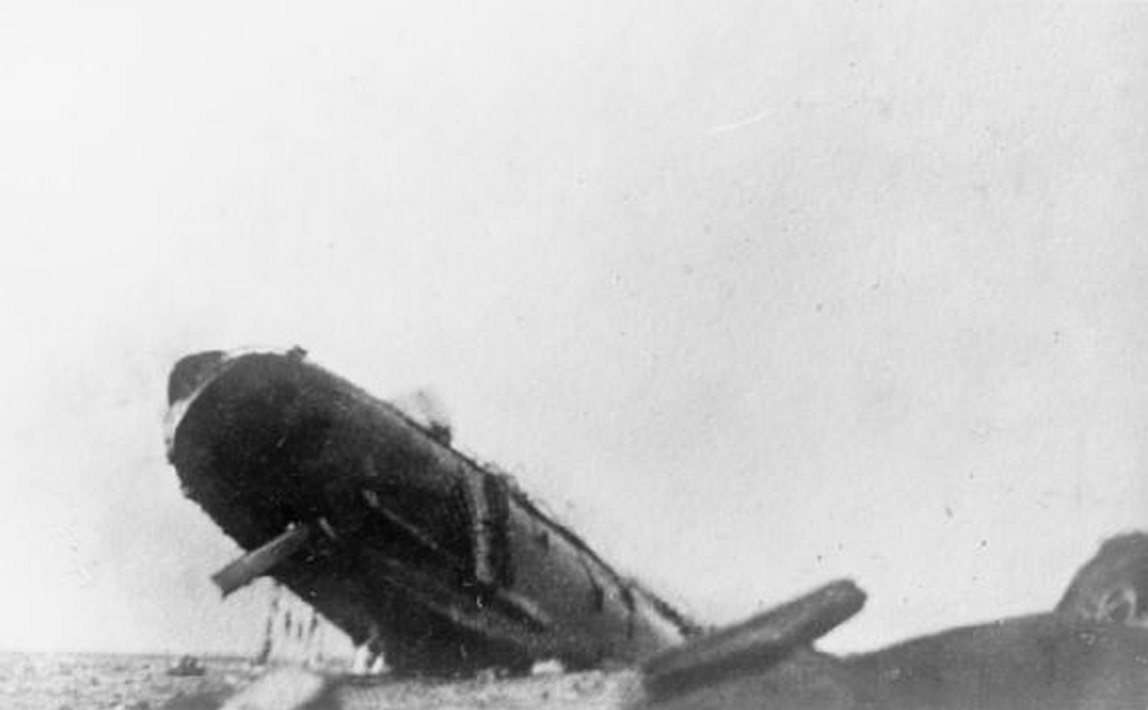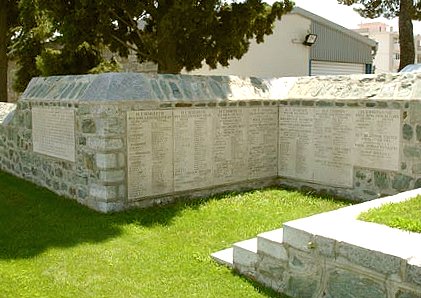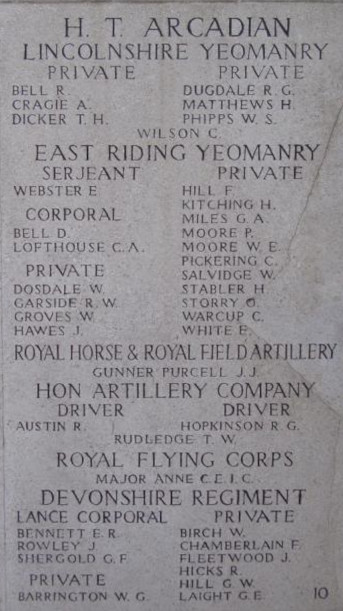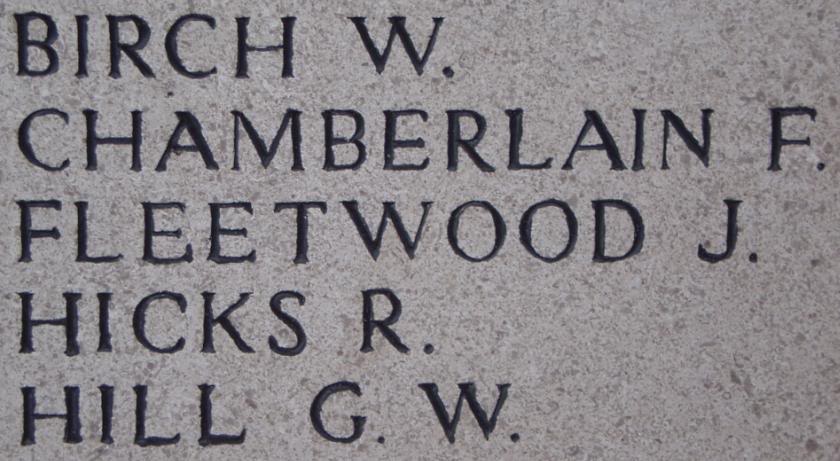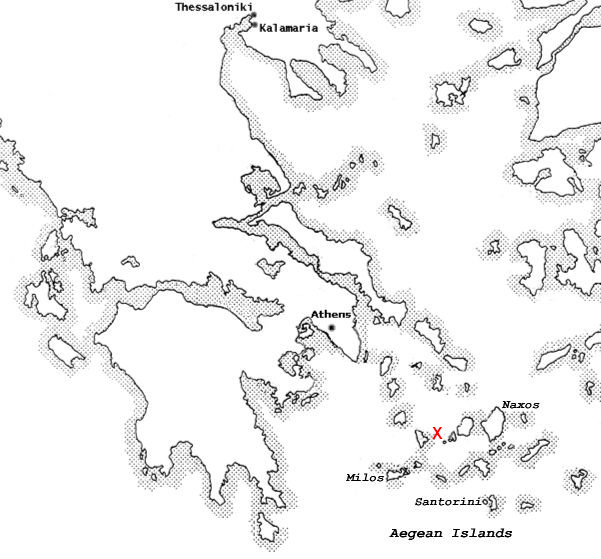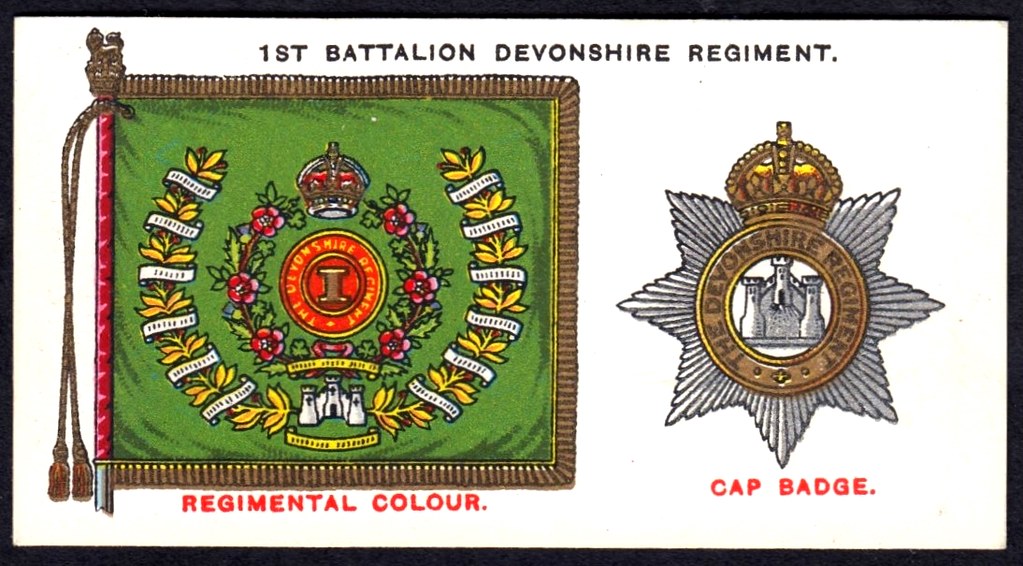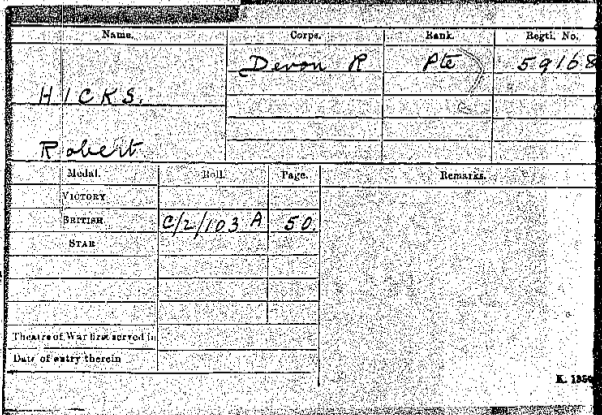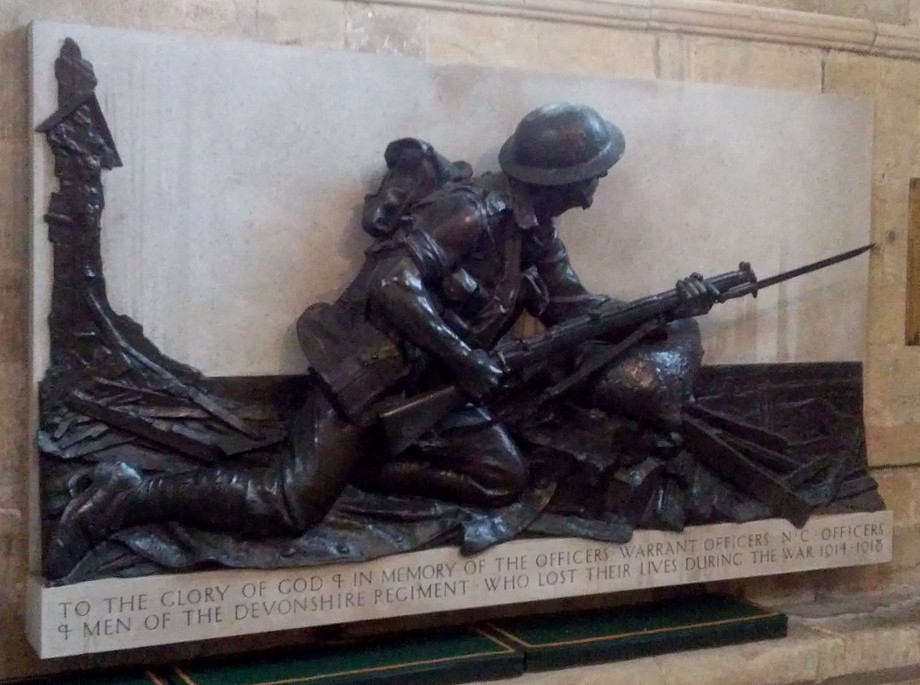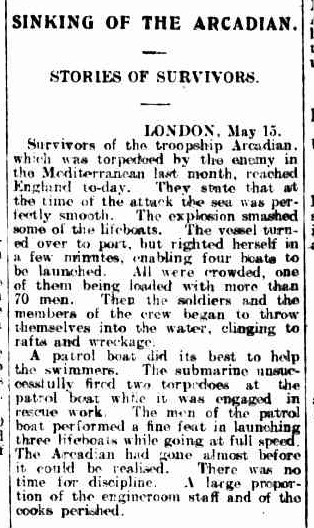| Private Robert Hicks January 5, 1893 - April 15, 1917
Semper Fidelis - Always Faithful |
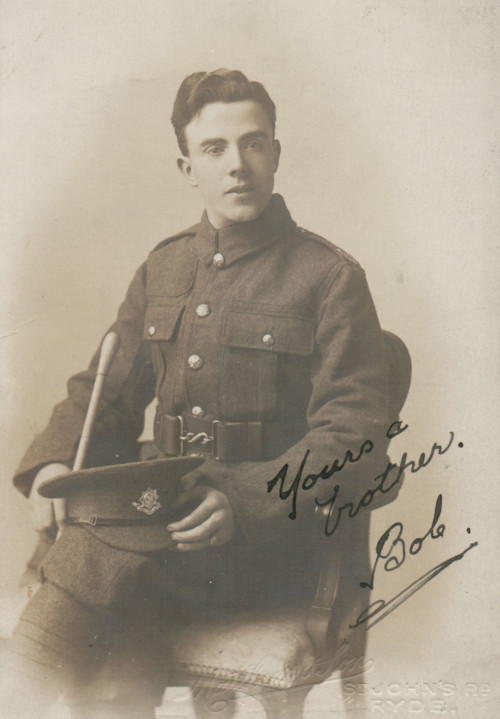
|
|||||||||||||||||||||||||||||||||||||||
Robert Hicks was the youngest of seven children born to Robert and Clara Jane Hicks. He was born in the Barton Regis district of Bristol, England on January 5, 1893.1 His father was a publican, beer retailer and master brick maker.2 His mother, originally Clara Jane Maggs, was born in Cardiff, Wales.3 Like many Englishmen of the time, Robert fought for King and Country in the First World War. He enlisted at Bristol and was joined to the 1st Garrison Battalion of the Devonshire Regiment.4 The Egyptian Expeditionary Force (E.E.F.) was formed in March, 1916 to provide overall command of the British and Commonwealth forces in Egypt. The E.E.F. was defending the British Protectorate of Egypt against attack by the Ottoman Empire who were allied with Germany.5 The 1st Garrison Battalion was being sent to Egypt as part of the E.E.F.6
The troops assigned to join the battle front in Greece disembarked at Thessaloniki. Remaining on board the Arcadian were 1335 people including Private Robert Hicks, one member of the company of troops of the Egyptian Expeditionary Force who would continue on to Alexandria, Egypt.
On the evening of April 14, 1917, the Arcadian embarked from Thessaloniki under the cover of darkness. The ship was sailing through the Aegean Islands, south-east of the Greek mainland.9
Around 6:00pm on the evening of April 15, the ship was about 26 miles north-east of the island of Milos.
Through the night we sped on our way down the Aegean Archipelago, and the following evening, a Sunday, saw our real encounter with the U-boat that had dogged us so relentlessly.The troops had just completed a boat drill when, without warning, the Arcadian was hit by a torpedo from the German submarine.10 There are two first-hand accounts from soldiers who survived the attack, and the sinking of the Arcadian. A private recalls the first moments of the attack: Without one moment's warning, a terrific explosion occurred, made hideous by the splintering into matchwood of great timbers, the crash of falling glass and the groaning of steel girders wrenched asunder, followed by the hissing rush of escaping steam from the ship's boilers....11An officer relates what happened next: The Times reported the following:
Robert Hicks was one of the ranks of enlisted soldiers who drowned. Though a number of bodies later washed ashore on some of the Aegean Islands (and are buried in Mikra British Cemetery at Kalamaria), most went down with the ship. Robert Hicks is listed among those commemorated on the Mikra Memorial whose bodies were not recovered in the sinking of the Arcadian.15 In 1919, Robert Hicks was posthumously awarded the British War Medal.16
To those members of the British expeditionary forces who lost their lives at sea a memorial was created. The Mikra Memorial is located within the Mikra British Cemetery at Kalamaria, about eight kilometers south of Thessaloniki (the port from which the Arcadian departed on its final voyage). As described by the Commonwealth War Graves Commission, the Mikra Memorial is commemorating almost 500 nurses, officers and men of the Commonwealth forces who died when troop transports and hospital ships were lost in the Mediterranean, and who have no grave but the sea.17The memorial commemorates those lost in the sinking of the Arcadian, Britannic, Ivernia, Marquette and Princess Alberta.18
Robert Hicks' name is inscribed on a memorial to those lost on the sinking of the H.T. Arcadian. Located in the Prescot and Whiston Methodist Church, Prescot, England.21
|
||||||||||||||||||||||||||||||||||||||||
|
|
||||||||||||||||||||||||||||||||||||||||
|
The following are two first-hand reports from survivors of the sinking of the Arcadian. The first is in regard to the loss of Driver Arthur Minney, presumed drowned; the second is by a soldier of the ranks, Reginald C. Huggins, written after the war.
From the "Minney Newsletter", July, 1991.25 Dear Madam, I am truly sorry to have to tell you that as a result of all enquiries we have made as to the fate of the men reported missing after the loss of the "Arcadian" on April 15th 1917, we have succeeded in obtaining only very little information. We are sending you an account of the sinking of the ship which has been given recently to one of our staff in Egypt, by a surviving Officer, and which we think will interest you :- "The whole thing was over so quickly that one can only record one's own doings - there was hardly any time to notice anyone else's. We had just had a practise boat parade and had been dismissed only a short time when there was a thud, an explosion in the fore part of the ship, and we almost immediately had a heavy list to port; it was then 6.15pm. Everyone had a lifebelt either on or with him, and each walked away to his allotted boat. I saw no panic whatever though the ship had rolled over to a very uncomfortable angle - I could easily step from the deck into the small boat which was already lowered and comfortable full. As happened in almost every case (owing to the speed and sudden listing of the ship) our boat was smashed to bits at once ere we could push away and most of us went down for some distance. On coming to the surface again, the ship was seen to be making its final dive and many of us were sucked under again. The second rising to the surface showed a great blank space covered with soot,debris and crowds of men clinging to wreckage or swimming about. It was almost impossible to recognise anyone. I saw quite a number of poor fellows who had evidently been killed very quickly, either by being hit by wreckage, or the sudden impact in falling into the water but saw no one I could recognise. The water was quite warm and the evening beautifully fine but as time wore on it became intensely cold, as one bobbed about half in and half out of the water. I happened to be nearly six hours in the water, but many were more fortunate. As the boat sank in four and a half minutes (time stated by our escort) from the moment we were hit, and the whole circumstances were so alarming and sudden, I think the absence of any panic, at any rate so far as I saw, was greatly to the credit of the men, and I was amazed that the loss of life was not greater. I should judge that the vast majority of the deaths took place instantly - the sea was so calm that it was fairly easy to catch wreckage or rafts once the ship was out of the way - even for non- swimmers with lifebelts on." As the names of all the survivors are known to the War Office, we fear that we must again tell you that there can be little or no doubt that those who are reported "Missing, believed drowned" lost their lives, and we desire to offer our sincere sympathy to the family and friends of Dvr. Minney. Yours faithfully for the Earl of Lucan Report dated 5th March 1918. Memoirs & Diaries: Torpedoed in the Aegean Sea26Tuesday, 20 November, 2001by Reginald Cecil Huggins The early part of April 1917 found H.M. Transport Arcadian, as she then was, with a full complement of "cannon-fodder" pushing her nose through the grey seas in the direction of the Eastern theatres of War, Salonika and Palestine. At that time the submarine blockade, which was intended to bring Great Britain to her knees, was in full swing, and the constant fear of the ocean traveller was the making of the unwelcome acquaintance of a torpedo, or "tin fish", as that death-dealer was familiarly known. Apart from one or two scares, no untoward incident occurred this side of Malta, and reaching that stage of the journey, one of the two Japanese destroyers that, so far, had afforded us protection, remained in harbour, leaving the Arcadian for the remainder of the journey with only one destroyer zigzagging at a respectful distance across our bows. The Japanese destroyer brought us, after days and nights of steaming, within sight of the African coast. This was the scene of our first brush with the enemy. A submarine had been spotted, and with the destroyer circling around at full speed, belching out the while a thick black smoke screen, we raced as fast as the engines would turn over, to a place of comparative safety, that being a small river on the north coast of Africa. There we were literally bottled-up for three days together with another crowded transport, while our underwater foe patrolled the river's mouth waiting and watching for us to come out. Upon the morning of the third day, the other transport set out only to return in the early afternoon in a sinking condition. After that, we were not too optimistic as to our chances, but in the early evening the Arcadian directed her nose seawards once more, steaming out into the open without mishap. Our Japanese friends, of course, still playing the part of protector. Arrived at Salonika, the troops intended for that front disembarked, and, under cover of darkness, we of the Egyptian contingent put forth to sea bound for Alexandria. Three hundred souls of us, however, were destined not to reach that objective. Through the night we sped on our way down the Aegean Archipelago, and the following evening, a Sunday, saw our real encounter with the U-boat that had dogged us so relentlessly. Without one moment's warning, a terrific explosion occurred, made hideous by the splintering into matchwood of great timbers, the crash of falling glass and the groaning of steel girders wrenched asunder, followed by the hissing rush of escaping steam from the ship's boilers. Nobody needed enlightening as to the fact that the old Arcadian, which had so often completed the Eastern trip, had received a "Blighty" one, and was shortly due for Davey Jones's locker. If doubts existed, these were soon dispelled, since, having given one convulsive shudder from end to end, the great ship began to settle down on her port side with the loose deck paraphernalia slithering about in all directions and dropping into the sea. To get away easier, I discarded my military boots, and donned a life-belt. On reaching the side of the ship and peering over, one of the two small boats which had survived the explosion was to be seen putting away full to overflowing with men. Nothing else remained but to make the descent into the sea by a rope conveniently to hand, and this I attempted. Unfortunately, my equilibrium on the ship's rail was disturbed by someone in great haste to be among the rescued, and, falling, my arm became jammed at the wrist between two steel uprights employed as supports. For moments that seemed long years, I was dangling from the side of the rapidly sinking Arcadian, but was rescued just in time from that perilous position by two comrades, one easing my weight from underneath the shoulders while the other wrenched the caught arm from the fixture. I do not know the identity of my rescuers to this day. Seizing the means of escape, I shinned quickly down into the sea - my hands suffering badly from rope-burns, and was surprised to find the water comfortably warm. My attire consisted of trousers, shirt and socks. The lifebelt, I found, supported my body so that my head from the chin was above water, and I looked about me, taking in the seascape. Being a non-swimmer at that time, I was unable to get clear of the ship, and her enormous bulk seemed likely to topple over upon me at any moment, supposing I was not sucked down one of the huge funnels by the inrush of water. That actually did happen to our Chaplain. He was, subsequently, vomited out again like a rocket and suffered no ill effects, when the water charging up against the heated boilers caused an explosion. Having read about the vortex a sinking vessel will make, I was ruminating on my chances as a survivor. The suspense, fortunately, was brief. For a moment or two the Arcadian partly righted on her keel and then with much hissing of escaping steam and explosions from the boiler rooms, she slid for ever out of sight of human eyes, carrying with her hundreds of troops and her own crew caught like rats on the lower decks. Within three minutes (official Admiralty time) from the time that she was struck all that remained of the ship was bits of floating wreckage. It is difficult to describe my sensations during the minute or so following. Down and still further down, I was dragged by the suction till it seemed that I must soon touch bottom. I was spun round with great rapidity and swirled about in an alarming manner. I held my breath and closed tightly both eyes and mouth, until forced by bursting lungs to take in air, I opened my mouth, getting a large helping of Aegean Sea. My mind was functioning normally. I can recollect that I had quite decided that H.M. Army was about to lose one live cavalryman. And though I cannot justly claim to being more courageous than my neighbour, it is curious that having made up my mind that my name would shortly appear in the casualty lists, I was not the least bit afraid. I can give no reason. I was young, eighteen at that time, having declared a false age on enlistment, and naturally I had no overwhelming desire to provide provender for the denizens of the deep. At last, however, I came with a rush to the surface, and was violently ill for some time. Glancing at my wristlet watch, I found it had stopped. The time was 5.45 p.m. Large numbers of drowned, the survivors, and a quantity of wreckage were close by me. After desperate efforts to propel myself through the water, I gave up in despair, finding that no headway was being made. That fact, however, was of no importance, as only miles of ocean waste stretched around. The sun now was lowered on the horizon: the sea became chilly and turbulent. The heads of the survivors by this time were dotted about with great distances between, they having drifted with the wind and the currents. After some hours, I was brought by the same means within reach of a small raft, which was clutched with considerable gusto, and I found myself in the excellent company of five officers, three Navy and two Army. Only an occasional word was spoken. Darkness descended quickly, and the sea was bitterly cold. Wafted across the waters, our ears received the words of the hymn "Nearer my God to Thee". Apparently every poor devil - more than three-quarters drowned - was doing his level best to swell the chorus on that awful night. The incident has imprinted itself indelibly on my memory. The combined weight of our six bodies completely submerged the slender support, but, nevertheless, by arrangement we each of us managed in turn to scramble on to the raft's surface and to get for a short spell as much of our numbed bodies above sea-level as was possible in the circumstances. This we continued to do, helping each other as best we could. Towards midnight a small white light was plainly visible in the far distance, and later another, and some time after, another. Through the ingenuity of one of the Navy officers we were shortly located. In his possession was an electric torch - quite unaffected, apparently, by its prolonged immersion - and with the instrument he proceeded to signal in the Morse code. We watched intently. The beam of a searchlight shot into the sky from the rescuing ships. It swung from side to side, missing our little group again and again. Eventually, however, it found its mark. Then quickly the lantern shut down to allow of a message to be flashed out. Slowly this was read to us by our friend with the torch. "Will pick you up soon as possible with other survivors". Utter blackness again and another long waiting; this time, however, with a hope. At last there came stealing upon us the tall black bows of a ship. The "Q" ship Redbreast she was. Voices hailed us from the deck. She drew swiftly alongside, and dropped a rope ladder. Down this came a couple of men, who heaved us up. A basin of piping hot grog, a belabouring with rough towels, a berth with an abundant supply of blankets and to bed. Trooper Reginald C. Huggins enlisted in March 1915 in the City of London (Rough-riders) Yeomanry. Underwent period of cavalry training in Ireland (Curragh and Dublin) and drafted the East Riding of Yorkshire Imperial Yeomanry for service on the Palestine Front. From there in early part of 1918 to France in the 102nd Machine Gun Corps. Wounded in the fighting before Valenciennes on October 28th, 1918, and discharged from hospital in May 1921. First published in Everyman at War (1930), edited by C. B. Purdom.
London May 15 Survivors of the troopship Arcadian, which was torpedoed by the enemy in the Mediterranean last month, reached England to-day. They state that at the time of the attack the sea was perfectly smooth. The explosion smashed some of the lifeboats. The vessel turned over to port, but righted herself in a few minutes, enabling four boats to be launched. All were crowded, one of them being loaded with more than 70 men. Then the soldiers and the members of the crew began to throw themselves into the water, clinging to rafts and wreckage. A patrol boat did its best to help the swimmers. The submarine unsuccessfully fired two torpedoes at the patrol boat while it was engaged in rescue work. The men of the patrol boat performed a fine feat in launching three lifeboats while going at full speed. The Arcadian had gone almost before it could be realised. There was no time for discipline. A large proportion of the engineroom staff and of the cooks perished.27 |
||||||||||||||||||||||||||||||||||||||||
|
Notes
1. Birth Registry certificate for Robert Hicks, in my possession.
2. "1891 Census of England and Wales" (online at FindMyPast.com), "Administration County of Bristol", p.29. Census information for Bristol, St.Philips & Jacobs North. "166 [Pennywell Road]... Robert Hicks... Publican". 3. Birth Registry certificate for Clara Jane Maggs, and Marriage Registry certificate of Clara Jane Maggs to Robert Hicks, both in my possession. She is often referred to, incorrectly, as "Sarah Jane Hicks" (see Appendix A above). 4. Commonwealth War Graves Commission entry for Robert Hicks, 59168. (Further information may be available at the Devonshire Regiment Museum, Barracks Road, Exeter, Devon, EX2 6AE or The Keep Military Museum, Bridport Road, Dorchester, DT1 1RN). Found at The Keep Military Museum website: "Formed in August 1915, the Garrison Battalion consisted of men who, although unfit for battle, were capable of discharging garrison duties. They served in Egypt and Palestine from October 1915 and were the last Devons to leave that theatre on their disbandment in the late summer of 1919."
5. See the "Sinai and Palestine campaign" at Wikipedia. 6. "Egyptian Expeditionary Force" (online at Wikipedia). 7. The Arcadian was originally named the Ortona. See "SHIP DESCRIPTIONS - O" (online at The Ships List) which references Merchant Fleets by Duncan Haws, vol.1, P&O, Orient and Blue Anchor Lines [Patrick Stephens, Cambridge (1978)]; vol.5, Royal Mail and Nelson Lines [TCL Publications, East Sussex, UK (1982)]; vol.8, Pacific Steam Nav. Co. [TCL Publications, East Sussex, UK (1986)]. See "ORTONA / ARCADIAN 1899": 7,945 gross tons, length 500ft x beam 55.3ft, two funnels, two masts, twin screw and a speed of 14 knots. There was accommodation for 130-1st, 162-2nd and 300-3rd class passengers. This was a one-off ship and had no sister ships. Built by Vickers Armstrong, Barrow-in-Furness, she sailed on her maiden voyage from London on 24th Nov. 1899 for Suez, Melbourne and Sydney for the joint Orient Line - Pacific Steam Nav. Co. service. In June 1902 she became a troop transport to South Africa and on 9th Oct. 1903 returned to the Australia service. In Feb. 1906 she was acquired by Royal Mail Steam Packet Co together with the rest of the PSNC Australian fleet and on 30th Apr. 1909 started her last Australia voyage. Converted to a cruise ship with accommodation for 320-single class passengers in 1910 and renamed ARCADIAN, she became a troopship in 1915. Used as a headquarters ship for Sir Ian Hamilton at Gallipoli, and on 15th Apr. 1917 she was torpedoed in the Eastern Mediterranean while en-route from Salonika [Thessaloniki] to Alexandria with troops. Out of 1,335 aboard, 279 were lost. See also Fascinating Facts of WWI. See also Marpubs. Dictionary of Disasters at Sea during the Age of Steam 1824-1962, London Stamp Exchange, London, 1969 by C. Hocking. p.42 (Available online at Imperial War Museum.) ARCADIAN
"Orient Steam Navigation Company / Orient-Royal Mail Line / Orient Line" (online at The Ships List). 1889 to 1906 service. See Ortona.
8.
"Memoirs & Diaries: Torpedoed in the Aegean Sea" (online at FirstWorldWar.com) by Private Reginald Cecil Huggins. An excerpt from Everyman at War, ed. C. B. Purdom (1930, London: J.M. Dent). Huggins, a survivor of the sinking of the Arcadian, reports his experiences. 9. "Memoirs & Diaries: Torpedoed in the Aegean Sea": [W]e of the Egyptian contingent put forth to sea bound for Alexandria. Three hundred souls of us, however, were destined not to reach that objective."Pacific Steam Navigation Company" (online at The Ship's List). Arcadian history details are listed under its previous name, the Ortona. "Piece details BT 99/3319" (available from the National Archives, UK). Crew list for Arcadian, ship number 110613, can be found in this document. "St Edeyrn's Church, Llanedeyrn, Glamorgan, Wales" (online at Remembering the Great War). There is a reference to the sinking of the Arcadian on a Celtic Cross memorial in the churchyard: "Ten names are recorded, each without rank of regiment, the first of which is that of Private Arthur Bennett who was drowned 15 April, 1917 when his ship, the Arcadian, was torpedoed and sunk en route for Egypt."
10.
Dictionary of Disasters at Sea during the Age of Steam 1824-1962, Op..st, p.42
Time of sinking taken from two first-hand reports: 11. "Memoirs & Diaries: Torpedoed in the Aegean Sea". 12. Minney Newsletter, p.12. The report of an officer who was on board the Arcadian. One curious note of those who survived the sinking of the Arcadian is the story of Thomas Therlfall who had survived the sinking of the Titanic exactly five years earlier — April 15, 1912. Threlfall later noted: "It was the same day of the week and the same date of the month that the Titanic went down and I have come safely out of both affairs." From Into the Danger Zone: Sea Crossing of the First World War by Tad Fitch and Michael Poirier, The History Press, 2015. Exerpt found at Encyclopedia Titanica. 13. Photo found at Imperial War Museum. 14. Minney Newsletter, p.11. Information from The Times, May 4, 1917 is reproduced. 15. Commonwealth War Graves Commission entry for Robert Hicks, 59168. Other 1st Garrison Battalion, Devonshire Regiment members lost on the Arcadian were Pte. William Birch (59169) (online at CWGC), Pte. Frank Pickett (59191) (online at CWGC), and Pte. Frederick Smith (59142) (online at CWGC and Malvern Remembers).
These are the places where [the solder] is entered in the rolls. The Victory Medal and the British War Medal are on one roll, and the Star on another.... The rolls are not available on line. They are held in original form at the National Archives in Kew. For thorough research it is essential that they are examined, for they often include more information about the soldier....On Robert Hicks' medal card (see WO/372/9, 40589 above) are the following: under "Roll" is "C/2/103A"; under "Page" is "50". "About the World War One Medal Cards" (online at National Archives, UK). British War Medal
17. Commonwealth War Graves Commission entry for the
Mikra Memorial.
18. Commonwealth War Graves Commission entry for the Mikra Memorial. HT "Marquette", torpedoed and sunk by 'U35' on 23 October 1915, 57.5 kilometres south from Salonika [Thessaloniki] Bay, carrying the 29th Division Ammunition Column and the New Zealand Stationary Hospital. HT "Ivernia", torpedoed and sunk on 1 January 1917, 93 kilometres from Cape Matapan, carrying reinforcements for Egypt. HT "Arcadian" was torpedoed and sunk on 15 April 1917, 41.5 kilometres north east from the island of Milo (Melos), carrying reinforcements for Egypt. Hospital Ship "Britannic", of the White Star Line, sunk by mine on 21 November 1916 in the Zea Channel between Greece and the Cyclades, on her way from Naples to Mudos. Fleet Messenger "Princess Alberta", sunk by mine between Stavros and Mudros on 21 February 1917.
19. “Mikra Memorial” (online at Find A Grave). Source of Mikra Memorial photo, © Commonwealth War Graves Commission.
20. Commonwealth War Graves Commission entry for Robert Hicks, 59168. Note his mother's name is given, incorrectly, as "Sarah Jane."
21. Roll of Honour located in the Prescot and Whiston Methodist Church, Prescot, England. Found at Prescot Roll of Honour.
22. Commonwealth War Graves Commission entry for Robert Hicks, 59168.
Clara Jane Hicks incorrectly referred to as "Sarah Jane Hicks" (see note 3 above). 23. “About the World War One Medal Cards”. 24. WO/372/9, 40589. 25. Minney Newsletter, p.12. 26. “Memoirs & Diaries: Torpedoed in the Aegean Sea”.
28. Player's Cigarette card "Regimental Standards and Cap Badges", issued in 1930. #22 1st Battalion, Devonshire Regiment. (Found at https://www.flickr.com/photos/44841559@N03/31048265692)
|
||||||||||||||||||||||||||||||||||||||||
|
Sources
British Merchant Ships Sunk by U-Boats in the 1914-1918 War by A. J. Tennent. Starling Pr., Newport, 1990. (excerpt found at WWI DocumentArchive) Commonwealth War Graves Commission The Devonshire Regiment 1914-18. Capt.C.T.Atkinson. Eland Brothers, Exeter, 1926. Dictionary of Disasters at Sea during the Age of Steam 1824-1962. C.Hocking. London Stamp Exchange, London, 1969. Everyman at War. ed. C. B. Purdom. J.M.Dent, London, 1930. (exerpt found at FirstWorldWar.com) FindMyPast.com FirstWorldWar.com The Great War: 1914-1918 Great War Forum Hereford City Council Imperial War Museum The Keep Military Museum The Long Long Trail Malvern Remembers Minney Newsletter - newsletter of the Minney One Name Study Group National Archives (UK) Naval-History.net Orders of Battle P&O Group The Red Duster - website of The Merchant Navy Association Roll of Honour The Ships List uboat.net Wikipedia The World War I Document Archive
Other members of the Devonshire Regiment who perished when the Arcadian was sunk April 15, 1917
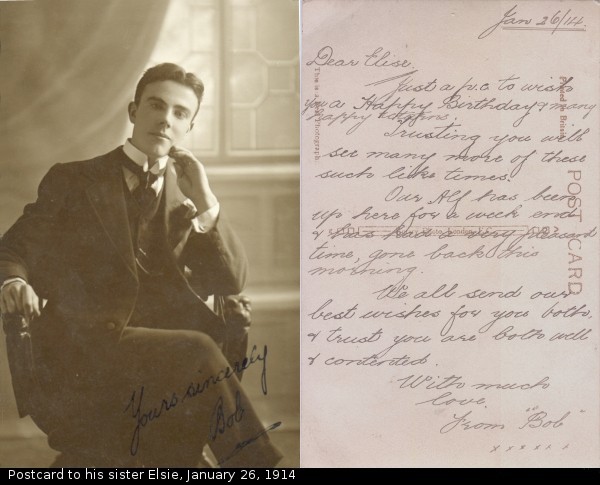
|
||||||||||||||||||||||||||||||||||||||||
